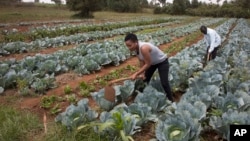Since the creation in 1963 of the World Food Programme, hunger has never reached such devastating highs as today. Nearly 350 million people are experiencing extreme hunger, with 49 million on the brink of famine.
There is little doubt that food security depends on fertile soils and crops adapted to climate change. It’s why the United States, the African Union, and the UN Food and Agriculture Organization launched the Vision for Adapted Crops and Soils – or VACS.
“VACS aims to foster more resilient food systems by developing climate resilient, nutritious crop varieties and building healthy, fertile soils,” said Dr. Cary Fowler, the State Department’s Special Envoy For Global Food Security. “Initially, we're focusing back on Africa. It's the region with the greatest need and the greatest potential.”
On the crop side of the program, VACS is implementing a three-step program.
“Overreliance on a few staples is risky and in the best of years. It can't provide an adequate diet or balanced nutrition for everyone. The good news is that Africa is rich with nutritious, traditional and indigenous crops,” he said.
“Expanding the spotlight and investments in these crops can unlock the potential to provide better nutrition, rebuild soils, support local communities and their cultures, and strengthen resilience,” said Dr. Fowler.
“The first step was to look at all those traditional and indigenous crops in Africa and ask which of those crops have the most potential for providing more nutrition. We narrowed the list down from 300 to 60,” he said.
“The next step is going to be to look at those 60 crops and ask, how are they going to do in a climate changed world on the basis of knowing which crops have the most nutritional value and most potential to provide good production in Africa, we can make informed decisions on crop breeding and other efforts.”
The third step, said Dr. Fowler, “is to establish the mechanisms needed to support that kind of work in a sustainable and in a fundamental way.”
“This doesn't mean that the United States or any of us involved are abandoning our work on major crops. It simply means that we're adding to this and taking advantage of the really tremendous … benefits that some of these traditional and indigenous crops offer,” he said.
“The program,” said Dr. Fowler, “is not going to solve all problems. No program could. But it does address two fundamental prerequisites for food security, having good soils and having good crops.”














